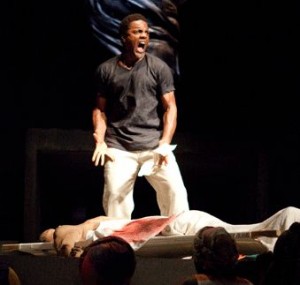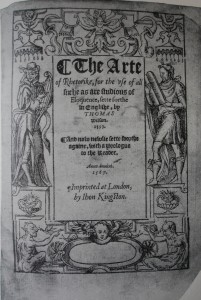I’ve always thought of rhetoric as a rather dry subject, but in a recent lecture barrister Benet Brandreth, the Royal Shakespeare Company’s Rhetoric Coach, zipped entertaingly through some of the principles in an hour. He succeeded in demonstrating how powerfully rhetoric, and in particular, one book, influenced the writing of Julius Caesar.
Elizabethan schoolboys would have learned Latin from books by authors like Lyly, and translated Latin texts like Ovid’s, but they would also have learned rhetoric, or the art of persuasion. Thomas Wilson’s book The Art of Rhetorique was first published, in English, in 1553, and went through eight editions by 1585. I went to the Shakespeare Centre Library and Archive afterwards to read their original copy. It dates back to 1567 and is a well-thumbed pocket-sized book, made for use rather than for show. Reading it must always have been difficult: each page is densely covered in black letter print, little space wasted on paragraphs and headings, and without decoration.
Wilson’s book was probably used in schools: the book’s ideas come from classical authors such as Aristotle and Cicero, but he gives many examples of how to put arguments into practice which Shakespeare expects his audiences to be familiar with too.
Brandreth’s talk covered much more than just Wilson’s book. In classical theory a person’s character is revealed by their speech. Shakespeare differentiates between characters, Cassius for instance using modern words, whereas Brutus favours old-fashioned language, a distinction today’s audiences are unlikely to pick up. Cassius uses a whole range of arguments to persuade Brutus to murder Caesar, but his words are carefully chosen: “honour”, “free”, “Rome”, and he reminds Brutus of his ancestry by using an example, a rhetorical device, that looks back to the founding of Rome:
I, as Aeneas, our great ancestor,
Did from the flames of Troy upon his shoulder
The old Anchises bear, so from the waves of Tiber
Did I the tired Caesar.
It’s with the speeches in the Forum, after Caesar’s murder, that Brandreth’s analysis became really interesting. We’re all used to hearing Brutus’s speech to the Roman crowd, which is then followed by Antony’s. What is it that makes Antony’s so much more persuasive? Brutus assumes the Romans are already on his side, addressing the Romans as “lovers”. He talks about Caesar’s ambition without giving an answer to the unspoken question of what offences Caesar had committed to justify his murder. He has what sound like logical arguments, but doesn’t back them up with facts, nor does he appeal to their emotions.
Antony’s speech, by contrast, is textbook. There are three elements in classical rhetoric that were essential for a persuasive speech: Ethos: authority and expertise (making them listen), Logos: reason (arguing the case), and Pathos: Emotional connection (making them care), in that order. And the speaker needs to tailor what they say to their audience.
Even a quick look at Antony’s speech shows how brilliantly Shakespeare does this, using examples, emotion, and appealing to the interests of the Roman crowd.
Brandreth also made a direct comparison with The Arte of Rhetorique. As well as explaining the theory, the book includes examples of how to fit an argument to different circumstances. One example is for when your listeners (the Judge) are not on your side, as in Antony’s case. Wilson describes how to start: “A privie beginning, or creeping in, otherwise called insinuation, must then …be used when…our cause [is] hated of the hearers”. “Nothing should be spoken at the first, but that which might please the Judge”:
I come to bury Caesar, not to praise him.
Wilson: “When the hearers are somewhat calmed, we may …say that those things, which our adversary doth mislike in the person accused, we also do mislike the same”.
The evil that men do lives after them,
The good is oft interred with their bones;
So let it be with Caesar.
Wilson: “And when the hearers are won, we may say that …we …speak nothing at all against our adversaries… Neither were it wisdom openly to speak against them, which are generally well esteemed and taken for honest men.”
Here, under leave of Brutus and the rest,
(For Brutus is an honourable man,
So are they all, all honourable men).
Where Brutus omitted to use examples to support his case, Antony uses them to refute Brutus’s claim that Caesar was ambitious:
You all did see that on the Lupercal
I thrice presented him a kingly crown,
Which he did thrice refuse. Was this ambition?
After he’s presented the logic of his argument he gets to the pathos. “If you have tears, prepare to shed them now”, he says, showing them Caesar’s gashed and bloody cloak.
Wilson: “In moving affections…the weight of the matter must be so set forth as if they saw it plain before their eyes”.
Then he shows them Caesar’s body itself, to
Show you sweet Caesar’s wounds, poor poor dumb mouths,
And bid them speak for me.
Finally he appeals to the self-interest of the crowd, telling them that by Caesar’s will they inherit money and the enjoyment of Caesar’s private gardens. In the palm of his hand after this performance, they take up his hint to “rise and mutiny”, against Brutus and the conspirators.
It’s a masterclass in the use of rhetoric, and one which Shakespeare may have taken almost point by point from Wilson’s little book.
The filmed version of the RSC’s current production is to be screened on Sunday 24 June at 8pm on BBC4. And here is the trailer to the stage version, which includes Ray Fearon performing part of his great speech.



